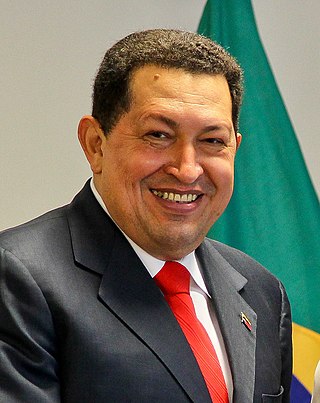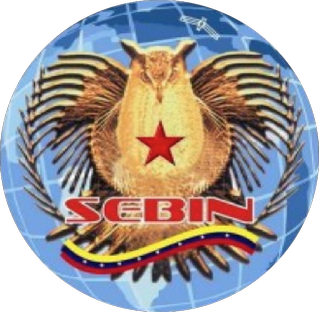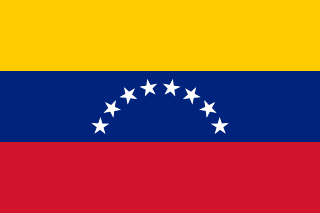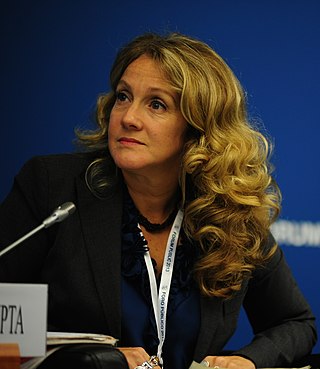
The politics of Venezuela occurs in a framework explained in Government of Venezuela.

Hugo Rafael Chávez Frías was a Venezuelan politician and military officer who served as president of Venezuela from 1999 until his death in 2013, except for a brief period of forty-seven hours in 2002. Chávez was also leader of the Fifth Republic Movement political party from its foundation in 1997 until 2007, when it merged with several other parties to form the United Socialist Party of Venezuela (PSUV), which he led until 2012.

Diosdado Cabello Rondón is a Venezuelan politician and current member of the National Assembly of Venezuela, where he previously served as Speaker. He is also an active member of the Venezuelan armed forces, with the rank of captain.

The Bolivarian Revolution is a political process in Venezuela that was led by Venezuelan President Hugo Chávez, the founder of the Fifth Republic Movement and later the United Socialist Party of Venezuela (PSUV), and his successor Nicolás Maduro. The Bolivarian Revolution is named after Simón Bolívar, an early 19th-century Venezuelan revolutionary leader, prominent in the Spanish American wars of independence in achieving the independence of most of northern South America from Spanish rule. According to Chávez and other supporters, the Bolivarian Revolution seeks to build an inter-American coalition to implement Bolivarianism, nationalism and a state-led economy.
The Bolivarian Circles are political and social organizations of workers' councils in Venezuela, originally created by President Hugo Chávez on 21 December 2001. The circles have also been described as militias and compared to Cuba's Committees for the Defense of the Revolution and Panama's Dignity Battalions.

A failed coup d'état on 11 April 2002 saw the president of Venezuela, Hugo Chávez, ousted from office for 47 hours before being restored to power. Chávez was aided in his return to power by popular support and mobilization against the coup by loyal ranks in the military.

The Bolivarian National Intelligence Service is the premier intelligence agency in Venezuela. SEBIN is an internal security force subordinate to the Vice President of Venezuela since 2012 and is dependent on Vice President Delcy Rodríguez. SEBIN has been described as the political police force of the Bolivarian government.

Telesur is a Latin American terrestrial and satellite news television network headquartered in Caracas, Venezuela and sponsored by the governments of Venezuela, Cuba and Nicaragua.

Corporación Venezolana de Televisión or VTV is a state-run television station based in Caracas, Venezuela, which can be seen throughout the capital and surrounding areas on channel 8. Programs that can be seen on VTV included Aló Presidente and Telesur Noticias.
Hugo Chávez, the President of Venezuela from 1999 until 2013, has elicited a variety of public perceptions regarding his policies, personality, and performance as a head of state.

The Universidad Bolivariana de Venezuela is a state university in Venezuela founded in 2003 by decree of President Hugo Chávez.

Relations between Cuba and Venezuela were established in 1902. The relationship deteriorated in the 1960s and Venezuela broke relations in late 1961 following the Betancourt Doctrine policy of not having ties with governments that had come to power by non-electoral means. A destabilizing factor was the Cuban support for the antigovernment guerrilla force that operates in remote rural areas. Venezuela broke off relations with Cuba after the Machurucuto invasion in 1967, when Cuban trained guerrillas landed in Venezuela seeking to recruit guerrillas and overthrow the government of Raúl Leoni. Relations were reestablished in 1974.

The level of corruption in Venezuela is very high by world standards and is prevalent throughout many levels of Venezuelan society. Discovery of oil in Venezuela in the early 20th century has worsened political corruption. The large amount of corruption and mismanagement in the country has resulted in severe economic difficulties, part of the crisis in Venezuela. A 2014 Gallup poll found that 75% of Venezuelans believed that corruption was widespread throughout the Venezuelan government. Discontent with corruption was cited by demonstrators as one of the reasons for the 2014 and 2017 Venezuelan protests.
Venezuelanalysis is a pro-Bolivarian Revolution website that describes itself as "an independent website produced by individuals who are dedicated to disseminating news and analysis about the current political situation in Venezuela." Its stated objective is "to counter the corporate media propaganda against the Bolivarian Revolution by giving a voice to leftist and grassroots movements in Venezuela".

Eva Golinger is an American lawyer, writer and journalist. She practices law in New York and specializes in immigration and international law. She is the author of several books about the late Hugo Chávez, of whom she was an outspoken supporter, and his relationship with the US. Chávez called her La novia de Venezuela, and she served as a foreign policy advisor to his government. The National Catholic Reporter wrote that Golinger headed the "pro-Chávez" Venezuela Solidarity Committee in 2004. Her website, venezuelafoia.info, aimed to shed light on what she called links between US government agencies and Venezuelan organizations by publishing documents obtained using the US Freedom of Information Act (FOIA).

X-Ray of a Lie is a 2004 documentary film examining another film, The Revolution Will Not Be Televised about the events of the Llaguno Overpass events, before the 2002 Venezuelan coup d'état attempt. The X-Ray documentary, directed by Wolfgang Schalk and written by Schalk and Thaelman Urgelles, accuses Kim Bartley and Donacha O'Briain of omissions and distortion in The Revolution Will Not Be Televised. It premiered on DVD in Venezuela in July 2004.

Bolivarian propaganda is a form of nationalist propaganda, especially in Venezuela and associated with chavismo, Venezuela's socialism. This type of propaganda has been associated with Hugo Chávez's Bolivarian Revolution, which used emotional arguments to gain attention, exploit the fears of the population, create external enemies for scapegoat purposes, and produce nationalism within the population, causing feelings of betrayal for support of the opposition.

Deborah James is an American activist. She is director of international programs at the Center for Economic and Policy Research (CEPR) and is on the Board of Directors of Global Exchange. Prior to her work for CEPR, James had been called "a top U.S. protest organizer" by the Center for Public Integrity. She was formerly the Director of the WTO Program at Public Citizen's Global Trade Watch, the Global Economy Director at Global Exchange, and the Executive Director of the Venezuela Information Office.
Daniel Kovalik is an American human rights, labor rights lawyer and peace activist. He has contributed articles to CounterPunch and The Huffington Post. He teaches International Human Rights at the University of Pittsburgh School of Law.

In Venezuela, a cult of personality has been created around the late President Hugo Chávez, where his supporters venerate him. Chávez largely received his support through his charisma and by spending Venezuela's oil funds on the poor.

















